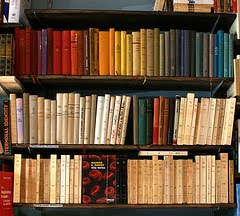
In 1973, when I went to university as an undergraduate, there were no open days. You were invited for interview, and maybe someone would show you round. Or not. Certainly, no parents would go, and anyone of my generation would have been mortified to be accompanied by parents on this very adult enterprise. Not so now, of course. At our open days, there are frequently more parents than students, and it’s the parents who tend to dominate the question and answer sessions. The most frequently asked question when I am performing is “what can my son/daughter do with an English degree?” I usually answer by agreeing that studying the Victorian novel or seventeenth century poetry is not, in itself, going to open any doors for them, but that the attributes they will acquire through diligent study and participation on their degree programme will be useful in a wide variety of careers. I often throw in an anecdote about a big cheese from a giant multinational computer company who visited the campus a few years ago. “I don’t care what degree subjects they have,” he said, “we can teach them all they need to know about computers in our training sessions. What I need are confident, articulate people, who can communicate well, who can work in teams and on their own initiative, who can write clearly and produce the goods under pressure, who can be organised and intelligent in their approach to work.” Which is, I point out to the parents, exactly the range of attributes we seek to instil in our students. I also add that an instrumental view of a degree programme misses the sheer pleasure of broadening horizons, discovering new ideas – of becoming culturally informed, not for any pecuniary reward or because of a job it might lead to, but to make you a better person- better informed, better educated, better placed to enjoy your life.
So I am dismayed at the current proposals to cut funding to humanities courses in the UK, at the behest of Lord Mandelson. We now have a government which doesn’t even have a department with the word “Education” in its title, and where HE is subsumed within the Business empire of the dark lord. Thus, courses which don’t have a vocational bent are to be sneered at: golf course management is better than History.
The great and the good of the world of scholarship have expressed their anger at this philistine and ruinous policy in a letter to the Observer. Here’s a taste:
The challenges facing the country and the world cannot be addressed without the arts and humanities. People’s complexity comes from their language, identities, histories, faiths and cultures. Without understanding that complexity we cannot address these challenges. Subjects such as literature, philosophy and history teach students to look at the world from a different perspective, to challenge ideas and to communicate effectively, to bring the flexibility and imagination that employers need and welcome.
We have already had the fatuous introduction of so-called “impact” into the Research Assessment Exercise (or “Research Excellence Framework” as we must now call it). Stefan Collini said all that needed to be said about that nonsense in this brilliant demolition job. Here’s a section, but you should really read the whole thing:
Let us take a hypothetical case. Let us assume that I have a colleague at another university (not all colleagues are in one’s own department, despite the league-table competitiveness of these assessment exercises) who is a leading expert on Victorian poetry, and that over a number of years she works on a critical study of what we might call a three-star Victorian poet (“highly innovative but not quite groundbreaking”). The book is hailed by several expert reviewers as the best on the topic: it draws on deep familiarity not just with Victorian poetry, but with other kinds of poetry; it integrates a wealth of historical and biographical learning in ways that illuminate the verse; it is exact and scrupulous in adjudicating various textual complexities; and it clarifies, modifies, and animates the understanding of this poet’s work on the part of other critics and, through their writing and teaching, of future generations of students, as well as of interested general readers. It also, it is worth saying, exemplifies the general values of careful scholarship and reminds its readers of the qualities of responsiveness, judgement, and literary tact called upon by the best criticism. It is a model piece of “excellent” research in the humanities. And its “impact” is zero.
Of course, in any intelligent use of the word, its impact is already evident from my description of its reception, but that, as we have seen, is explicitly excluded for this purpose. Moreover, any other kind of impact is only going to be credited to my colleague’s department if it can be shown to be the direct result of its own efforts. So if, say, the Departmental Impact Committee can be shown to have touted their colleague’s new “findings” to a range of producers in radio and television, and if, say, one of those producers takes an interest in this particular work, and if, say, this leads to a programme which bears some relation to the “findings” of the book (which, if they are interesting, can probably not be summarized as “findings” in the first place), and if, say, there is some measurable indicator of audience response to this programme, then, perhaps, the department’s score will go up slightly. And if not, not.
Let us leave aside for the moment the very considerable expenditure of time and effort any such process involves (often for no result), and let us also leave aside the fact that there is no reason to expect a literary scholar to be good at this kind of hustling and hawking.
As we approach May 6th, please ask your prospective candidate for the general election what his or her views are on funding for research in the humanities, and take the answer into account when you vote.
Image: Kairos-77

A little while ago, in a fit of new year uncluttering, I signed up via a facebook group to a campaign to stop junk mail. Their website is a treasure trove of advice on how to stop the deluge of unsolicited junk that arrives on a daily basis. I used their web widget to get rid of junk mail from a variety of sources, and it is certainly making a difference.
Then, yesterday, came this:
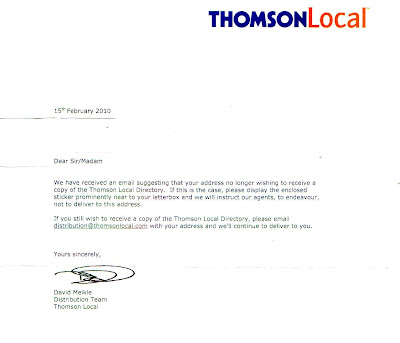
So, Mr Meikle with the showbiz signature, you think that, instead of simply crossing my address off the list of houses you are going to dump your useless directory on, I should deface my front door with a 6″ by 4″ sticker in your corporate colours to prevent your operative delivering something once a year? It seems their response to a request to stop sending me junk is… to send me some junk. Here’s the offending sticker:
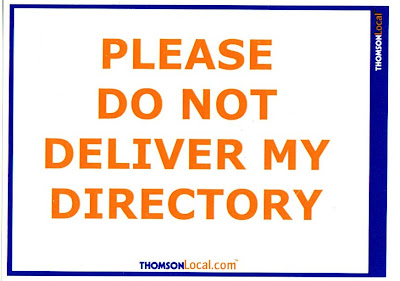
I shall be contacting Mr Meikle, and will report back.
Update, 1st March. Reply from Thomson:
Thank you for your email. The stickers are offered as an option to make it easier for our distributors to identify a non-delivery household. Naturally, we respect your choice not use the sticker and will add your address to our list for non-delivery.
Thank you for your enquiry,
Yours sincerely,
Yo. Green
Hmmm – how will they know my address, since I’ve communicated by email? Not very convincing is it?
Top image: Fiasco
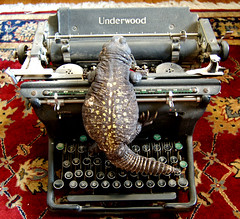
Slack blogging around here since Christmas. Sorry about that- pressure of work, and a trip to a snowy Munich are to blame. You can see the view towards Odeonsplatz from the Englischer Garten in the new header – schön, oder?
It seems that Topsyturvydom’s glorious victory against the mighty Writers Bureau was not the unalloyed success it first appeared to be. I’m grateful to Padraig Colman for his excellent and detailed account of the, er, service they provide. Padraig is clearly an accomplished writer, as his work on Sri Lanka shows, so it is a concern that his experience was so dispiriting – but not really a surprise. My attention was drawn to a defensive piece by a Writers Bureau tutor, Nick Daws, who, whilst agreeing that the school’s publicity was misleading, says that “The Writers Bureau is a reputable organisation which in general offers a good service to its students” and finds them merely “lazy” in their inflated and erroneous claims. Padraig and I, and a number of other students, might differ with the author of Write any Book in Under 28 Days (what, really? Like, you know, Ulysses and stuff? Cool!)
There is a school of thought that suggests that writing, particularly of the creative ilk, can’t really be taught. Here’s A.L. Kennedy on that issue, and, as always with her, it’s worth reading.
Image: Busymonster

At the top of this page, you’ll see a “next blog” button, and clicking it takes you to a random blog. In an idle moment, I clicked yesterday, and on the third click, was presented with a
blog I didn’t know, but which was written by someone I do know, and featured pictures of many people I know. Since, according to
this, there are currently
133,000,000 blogs – and OK, Blogger is only one platform, but probably the biggest – what are the chances of this happening? And should I buy a lottery ticket this week?

To the Martin Harris Centre, for an event with Martin Amis, one of a series that exists largely to justify his salary, I expect. The attraction for me was not so much Amis fils, but Clive James, who, since he’s now three-score years and ten, was considered to be a suitable candidate for a debate about ageing and literature. Ghoulishly, Clive’s old (in every sense of the word) sparring partner Peter Porter was too ill to attend. That didn’t matter of course, since Clive can talk enough for a dozen. Amis looked like an ageing roué, in a raffish Leslie Phillips sort of way. Clive eschewed the trademark leather jacket in favour of a black polo shirt disturbingly like the ones I habitually wear.
The two of them then both made opening statements. Amis pointed out that the forties were the time when you discovered mortality, but the fifties were when you discovered death. You look in the mirror, and you know death is interested, is intrigued by you…
His basic premise was that writers invariably declined as they got older. Mr Amis is 60.
Clive, working with no notes, and speaking far more fluently than Amis – who did have notes – refuted the Amis argument with a string of examples. What struck me about Clive is that he speaks in sentences, perfectly formed, balanced, with barely a pause or an erm or a y’know. It’s quite uncanny, really. There was some good knockabout stuff at the expense of Roth and Updike, but Clive insisted that even when youthful inspiration has gone, the craft remains to sustain the writer. He also confirmed what I have long suspected- that his recent prolificity is a conscious decision to get stuff out with time’s winged chariot in the background.
…and doesn’t Martin look exactly like his dad these days?
Update: Just read the review of two of Clive’s recent books in the current (Dec 18th) TLS. As Oliver Dennis says: “In what is surely the final phase of a glittering career, Clive James is busier than ever. No other contemporary writer is more aware of the ticking clock, or more likely – time permitting – to deliver on a promise.”
Further update: the podcast of the event is now available here.
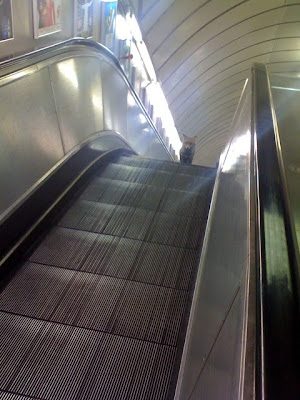
Great snap of a foxy traveller.
Credit: RadioKate

In my imagination, Hitchcock’s film was in black and white – probably because I saw it on TV in about 1968 in b&w. Seeing the Vistavision print in colour at the Cornerhouse today was a revelation. Why is it, that even when you know the story, the shocks are still, well, shocking?
I don’t think my adolescent self appreciated quite how much innuendo there is in the banter between Cary Grant and Eva Marie Saint, though even I got the train-into-tunnel metaphor back then.
So- things I noticed that I hadn’t before:
Cary Grant was my age then. He is old enough to be Eva Marie Saint’s dad, although she was ten years older than the part she was playing.
Jessie Royce Landis, who played Cary Grant’s mother, had also played Grace Kelly’s mother in To Catch a Thief, and was just seven years older than Grant.
He was very tanned.
He, and the other male leads, wore suits of a blue-grey hue. Was this the dernier cri at the time?
Leo G Carroll as the Professor is trying out for his role in Man from UNCLE.
Why, other than to stage one of the best scenes ever, would you decide the best way to kill your victim was to arrange for him to travel to a remote landscape where you could attack him with a crop-spraying plane?
Hitch’s traditional cameo appearance is in the first few seconds.

Reading this obituary took me back thirty odd years to a lecture theatre in a brutalist concrete building in Leeds. The first year English students were being lectured about accent and dialect by the great Stanley Ellis. He asked one of our number, picked at random, to say a few words. He’d chosen Bob McNally, a lad whose accent to the rest of us was just “Geordie”. Stanley had other ideas. After listening for no more than a few seconds, he identified the precise area within Newcastle where Bob came from, and also suggested that he’d spent some time in his adolescence away from Geordie land, naming, I think, an area in Yorkshire. An astonished Bob confirmed this was the case. We applauded.
Stanley Ellis was a delightful, down to earth man with a passion for the linguistic diversity of this country. Leeds had become a major centre for the study of accent and dialect, thanks to Harold Orton’s Survey of English Dialects, to which Ellis contributed. The arrival of this man, in a caravan, with an unwieldy primitive tape-recorder, must have been startling for the rural communities he visited- especially when he asked the questions. The researchers wanted to avoid planting words in the minds of the subjects, so, if they wanted to elicit the local word for a cowshed, say, they would ask something like “What do you call the building where you keep the animals that go moo?” One can imagine how this might have gone down with the tough farming types who were the typical respondents.
Stanley’s party piece could be useful, as the obituary reports:
He came to national prominence when he declared that a tape released by the police in June 1979, purporting to be the voice of the Yorkshire Ripper – then suspected of the murder of 10 women – was by a hoaxer, someone who hailed from Castletown, a small village on the edge of Sunderland, Tyne and Wear – many miles from the scenes of crime. The police disregarded his warning, a decision that may have put their investigation on the wrong track for more than 18 months.
Ellis was proved to have been right in 2005, when the hoaxer was identified and shown to have lived all his life within walking distance of the area Ellis had pinpointed.
Another former student wrote to the Guardian, with a similar story to mine – Stanley must have delighted and entertained thousands of students with his ability, born, of course, of intense study.

Too busy to blog much of late, but thought I would mention a gig by The Visitors. They were at The Studio in Manchester to launch their new CD, and a small but select band were there to see it. They are led by Karl Walsh, a Madchester scene veteran, and play power pop with some interestingly subtle vocal arrangements, mainly as a result of the interplay between Walsh and the other lead singer, Mike Crook.
As the website and video suggests, they’ve gone for a visual vibe that owes a lot to fifties science fiction, particularly, it seems to me The Day The Earth Stood Still, with Walsh as Klaatu. That’s reflected in the song Visitor, which puts them in the select bracket of groups who have written a song with their own name as the title – Living in a Box springs to mind.
At the gig, from which my eardrums have just about now recovered, two weeks later, Karl turned up in silver lycra, but the rest of the band obviously didn’t fancy the look, so there was a curious mismatch. From left to right, we had Klaatu, Mike as Steve Harley, and, behind them, er, two blokes who’d turned up from the council to collect your old fridge on bass and drums. Still, the sound, particularly from bassman Paul Petricco was prodigious, and, with a bit of exposure, there’s no reason why they shouldn’t do well. I’d drop the silver lycra though.
More music on this allegedly literary blog. People often claim to have very broad musical tastes, but this is frequently not borne out in fact. When some starlet or reality TV show participant says something like “Oh I love all kinds of music – anything from Rihanna to the Pussycat Dolls” you sense that their idea of music isn’t, shall we say, particularly well-developed.
Jools Holland, whom God preserve, said on his radio show recently that it really annoyed him when people said of a particular artist or type of music “Oh sorry, before my time” as if anything that existed before they were born could not possibly have any relevance to them. Yes, quite. Thus, I feel happy with a really wide range of music. I never understood rap, in which I always find the c is silent, and I’d rather folk songs were sung by folk, instead of Peter Pears. And don’t ever take me to your lieder. Apart from that, though, pretty much anything goes. So here’s the latest eclectic mix of live music encountered by me and ‘er indoors.
Quatuor Danel

If you are occasionally in Manchester on a Thursday lunchtime, and you need sustenance of the musical kind, the Martin Harris Centre is the place to be. This innovative centre presents regular free concerts at lunchtime, and recently this string quartet gave a performance of two standard repertoire items, Haydn’s String Quartet op.1 No 1 and Mozart’s String Quartet KV 465 together with a brand new piece by Pieter Schuermans. The Haydn and the Mozart were sublime, and the concentration of the players noticeable. I particular enjoyed the flourish which the leader, Marc Danel, brought to his work. The Schuermans piece was, as they say, “challenging”, but was played with enormous attack by the four musicians, and the single long movement impressed with its energy.
>Damien Maddison

Damien recently went solo after some time with his band Maddison – there were, in the time-honoured phrase, musical differences. Damien appeared as part of the annual In the Cityevent at The Moon Under Water, a huge Deansgate pub. We went with the estimable local DJ and rock chick (she wishes) Caroline Rennie. Damien played with a pick up band, with whom he had one hour’s rehearsal. Considering that, he was pretty good, and the current highlight of his set, the withering “Absolutely Tib St.” (spot the Dylan reference) was certainly enhanced by the beefed-up electric sound. Damien’s work is recognisably in an English singer-songwriter tradition, and whilst he clearly owes something to people such as Ray Daviesand Ian Broudie, he has a distinctive voice and a great facility with words. “Absolutely Tib St.”, which is even more effective when you know what occasioned it, spits out bile in splendid fashion – and it’s not often you come across “sanctimonious” in a pop lyric.
The Unthanks
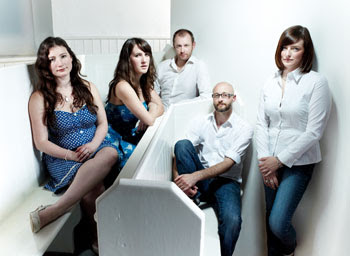
To the newly refurbished Band on the Wall, last visited by me 27 years ago. It’s changed a bit, as have Rachel Unthank and the Winterset, now officially The Unthanks. Ten of them crowded on to the small stage. The line-up is basically a string quartet, two brass players, drums, bass, keyboards, guitar, and various other instruments- all the players swapped instruments at regular intervals. The ethereal sound of Rachel and her sister’s voices, that made the previous incarnation of the group such a success, is preserved in the big band version, but with hugely improved capacity for new textures and modulations. It helps that they have gathered some brilliant multi-instrumentalists around them, even if some of them looked like they had wandered in from the school band rehearsal. Great harmonies, some really unusual songs -not just folk – and some fantastic playing. The venue is mainly standing, but if you get there early, you can sit on the balcony, which is what we did.
So- an eclectic few days, and lots more to come in the musical maelstrom that is Manchester.












